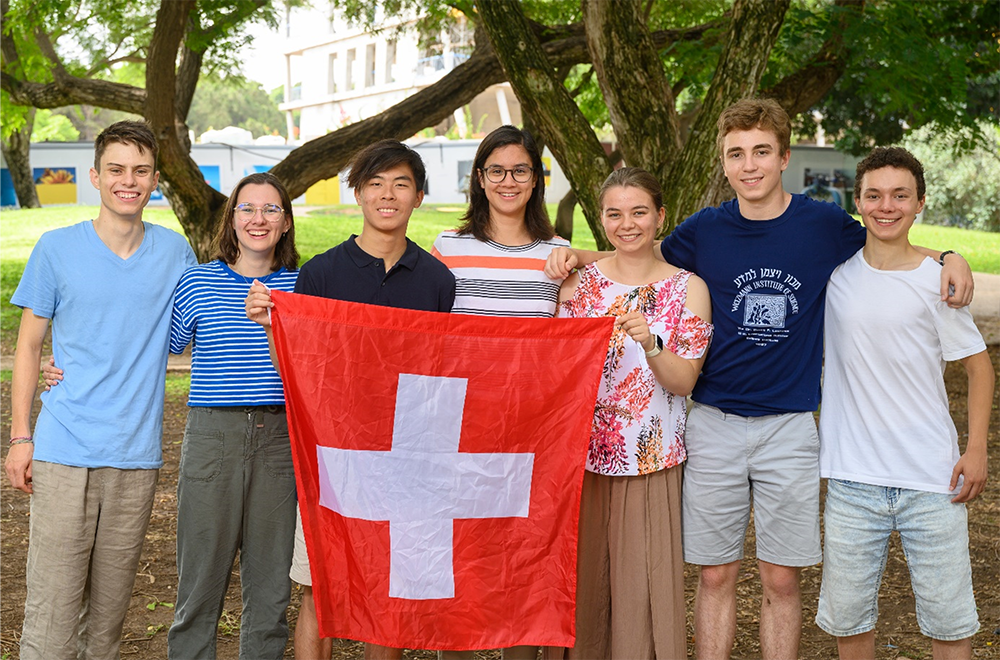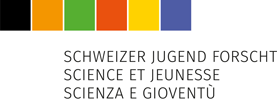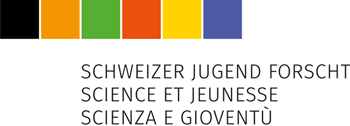Bericht aus dem Weizmann Institute of Science, Rehovot, Israel – geschrieben von Jasmine Kofmel und Sebastian Bolli
Hello everyone, we are Jasmine Kofmel and Sebastian Bolli. This year, at the 57th Swiss National Science and Youth Competition, we were fortunate to win the Dr. Bessie F. Lawrence International Summer Science Institute (ISSI) prize at the Weizmann Institute of Science in Rehovot, Israel. This four-week science camp united around 70 participants from 14 nations. Alongside 2-4 other participants, we immersed ourselves in a three-week research project under the guidance of PhDs and Post-docs. During weekends and the final week, we explored the beautiful country of Israel.
We are very excited and honored to have been a part of this amazing program, exchanging ideas and engaging with fellow young scientists from across the globe, all while gaining valuable insights into Israel’s culture and heritage. But most importantly we made so many new friends with similar interests!
Here are some of the highlights of our month in Israel.

The Israeli coastline seen from Rosh HaNikra
Start of the adventure
We were overjoyed and filled with gratitude upon receiving the prize, even if we both were unsure what it was because the announcement was quite fast and we were concentrated on not falling off the stage :-) Coincidentally both of our parents were sitting next to each other in the audience which led to us discussing our prizes and realizing that we are going to the same place! We were happy to already have found a friend that will also come on this amazing journey.
Before ISSI started, our mentors reached out and sent us papers to prepare for the upcoming research project. At the start all the new terms were overwhelming, but it was great to watch the process of starting to understand more and more.

The placard in front of our bungalows with the flags of the 14 different countries.
Arrival
We arrived at Ben Gurion Airport in the middle of an ongoing protest directed against the extremely controversial (and now implemented) justice reform by the right-wing government of Benjamin Netanyahu. First thing we saw were the huge Israeli Flags waving around us and we heard the voices of over 150’000 people shouting “Democracy”. Luckily, we were able to navigate the protests and our bus shuttle brought us to the huge campus of the Weizmann Institute of Science. Upon arrival, we were directed to our bungalows, and later gathered at the club house, where we got to know the other participants. The next day we had an introduction session during which we were acquainted with our mentors and shown the laboratories. The following days we worked on our scientific projects in the morning and in the afternoon, we had different lectures from professors at the Weizmann Institute of Science, including Nobel Prize winner Ada Yonath, who talked about her discovery of the ribosome.

The Weizmann campus with the famous Koffler Particle Accelerator
Weekend Trips
On the weekend, we travelled across Israel. The first weekend we spent in the holy city of Jerusalem, where we visited the tower of David, the holy Jewish Western Wall, and the Church of the holy Sepulchre. A special attraction was our stroll through the oriental bazar, teeming with people. We also spent a day in the desert in a natural reserve called Ein prat.
The second weekend we spent in the north of Israel, we visited the Bahai gardens in Haifa, had lunch with a Druze community (the food was absolutely delicious) and spent the night in a hotel very close to the Lebanese border in Shlomi. The following day we went hiking on Mount Meron and we visited the chalk cliffs of Rosch HaNikra.

The Swiss participants

The 72 Participants from 14 nations

The ISSI in Jerusalem
Trip to the Negev desert and Eilat
After the intense period of submitting our final research reports, we embarked on an exhilarating desert expedition! This was an amazing reward for the diligent work of the past two weeks, even though it did not award us with much sleep… Waking up at 3 am to commence our hikes was essential to beat the scorching daytime temperatures. Most of our hikes led us to water bodies, including a unique experience of snorkelling and swimming in the Dead Sea. Despite the initial rejuvenation of floating weightless, the intrusion of salt into unexpected places brought us back to reality.
Among the unforgettable moments was spending a night under the stary sky. We arrived at our camping spot after sunset and left in the morning before sunrise. Even if our sleep was minimal (ca. 1h) our spirits were uplifted by a captivating sunrise hike the next morning.

The holy city of Jerusalem
Coming to an end
As the overwhelming weeklong trip concluded, we were struck by reality, confronted with the task of preparing and delivering our research presentations in the following days. During one day all the groups presented what they had been working on in their labs, allowing everyone to share the outcomes of their lab work. It was very interesting to get a quick insight into what everyone else had been working on. Following the presentations, a large group of students visited Jaffa, where we enjoyed a sunset swim, and as the night continued the student-group grew and we embraced the adventure of navigating public transportation with over 30 students.

The green North of Israel with a view to the Lebanon and Syria (view from Mount Meron)
Beginning of a new chapter
On the final day, we got together for a closing ceremony, during which students showcased their «arts and science» projects related to the theme dynamic space. The Australian participants were the first ones to depart which started our emotional night of farewells. Sleep was far from our minds; we were determined to savor every remaining moment together. It was sad seeing the life of the youth village diminish, and the group getting smaller, one country at a time as we said our good-byes and hopeful «see you laters”.

The Bahai Garden in the city of Haifa

The research team of Jasmine Kofmel (left) with her peers from Canada and Israel with the mentor Dr. Nemanja Stanojevic



